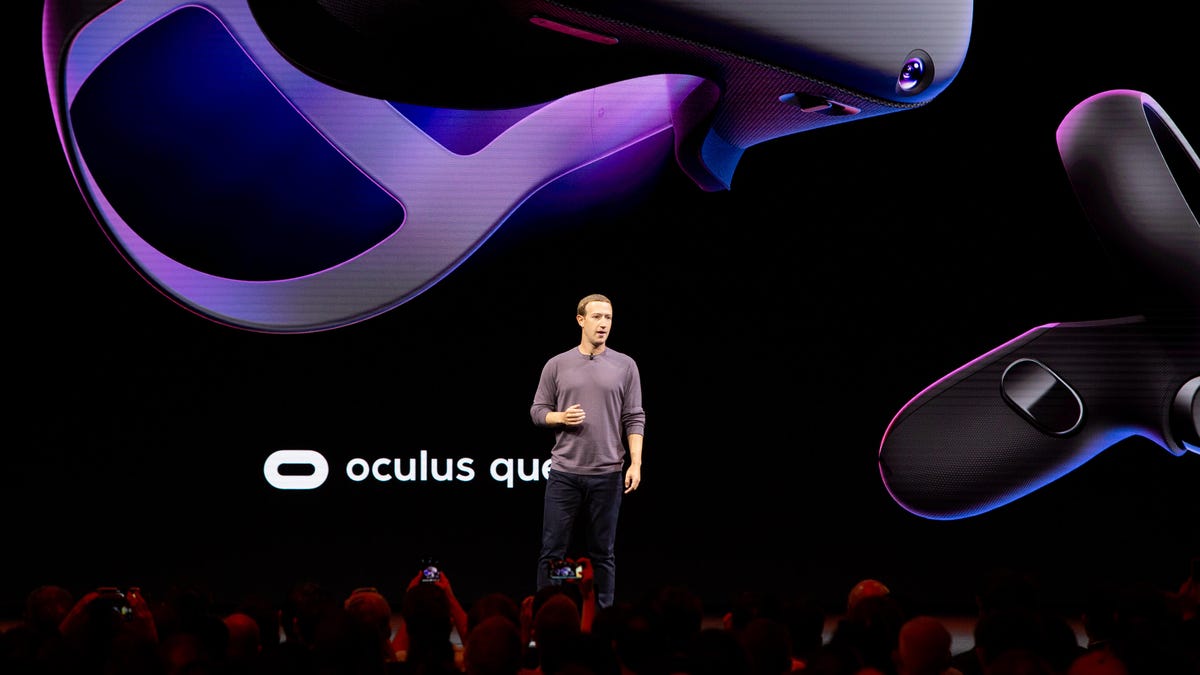Facebook Connect: What to expect from the company's big VR show
Virtual reality hasn't gone mainstream, but the industry is still moving forward.

Facebook CEO and co-founder Mark Zuckerberg speaks at Oculus Connect in 2019. The conference has been rebranded as Facebook Connect this year.
When Facebook purchased virtual reality headset maker Oculus in 2014, the social network's CEO, Mark Zuckerberg , raised expectations by saying the technology would be the next big computing platform.
"Oculus has the chance to create the most social platform ever," Zuckerberg said at the time Facebook announced its $2 billion acquisition of Oculus. The VR headset maker would "change the way we work, play and communicate."
Six years later, virtual reality hasn't lived up to that hype, even with a pandemic that keeps people at home and forces them to rely on technology to stay in touch. Still, Facebook hasn't stopped betting on VR, as well as AR, or augmented reality. At 10 a.m. PT Wednesday, the social media giant will kick off its annual AR and VR event, a conference that used to be known as Oculus Connect. (It's since been rebranded Facebook Connect.)
The online event will showcase the work of Facebook Reality Labs, the company's AR/VR team. You can watch the conference live on Facebook Reality Labs' page or through Oculus Venues, a way to view live entertainment via virtual reality.
Virtual reality immerses users in a digital environment, while augmented reality involves superimposing virtual objects onto a user's view of the real world. Facebook faces stiff competition in the field, particularly from Sony and HTC . It's No. 2 in VR headset sales, shipping 28% of last year's estimated total, according to data from Statista. Sony shipped more.
"There's a spike in awareness and interest in adopting these technologies, not just from consumers, but enterprise," said Tuong Nguyen, an analyst for Gartner. "Despite that, there's still some hurdles that VR needs to overcome," including price, available content and design, Nguyen said.
Facebook's Oculus Quest, a VR headset that doesn't require a PC to function, has been repeatedly sold out this year. Consumer demand for the headset has increased, but the coronavirus pandemic has also impacted the production of hardware used in these devices.
Facebook Connect will kick off with a keynote speech. The conference website doesn't say who'll be speaking, but Zuckerberg and other Facebook executives have delivered opening remarks in the past.
Here's what to expect from Facebook's big AR/VR show:
Oculus Quest 2
There have been multiple signs this year that Facebook will release a new version of the Oculus Quest. The headset was released last year, and prices start at $399.
In May, Bloomberg reported that Facebook's Oculus division was working on a new version of the Oculus Quest and Touch controllers, with multiple test models in the running. In addition to being lighter, some of the models featured faster image-refresh rates, to make content look more realistic, the news outlet said. Facebook reportedly plans to launch the new headset during this year's conference, but shipping could be delayed until 2021 because of the pandemic's impact on the availability of hardware.
This month, UploadVR reported that retailers B&H Photo Video and Overclockers in the UK have listed the Oculus Quest as discontinued. On the B&H Photo Video website, the language was changed to back-ordered. A UK sales representative from another retailer also told UploadVR that there were no further shipments coming for the Oculus Quest because it was "marked as end of life."
Social VR
Facebook Connect's schedule includes several sessions about social VR, including ones that focus on creating live performances and media experiences.
Facebook has been working on a virtual social experience called Horizon that's currently being beta-tested. CNET's Scott Stein and Joan Solsman got a sneak peek at the virtual world, which is filled with cartoon avatars, games and shows.
"The ability to make and share creations is clearly aimed at game-playing and experience-crafting, which could make Horizon feel like a multiverse theme park," Stein wrote.
AR glasses
During last year's Oculus developer conference, Andrew "Boz" Bosworth, who oversees Facebook's AR and VR efforts, confirmed that the social network is making augmented reality glasses and had already developed a few prototypes.
Even before Bosworth's remarks, there were reports that Facebook was working on AR glasses. Last year, CNBC reported that the glasses were code-named Orion within the company, that the tech giant was teaming up with Luxottica, which owns Ray-Ban, and that the glasses would be ready for consumers between 2023 and 2025.
The glasses will allow people to answer calls, see information in a smart display and livestream content to their social media followers and friends, according to the report.
In September, Facebook said it was working on technology that could enhance audio in noisy environments with AR glasses. Facebook has yet to spill any more details about the status of these AR glasses, but the conference gives the company a chance to provide an update.
Brain-computer interface
Outside of VR and AR, Facebook has also been working on projects that seem like they're straight out of a science fiction movie.
The company owns a neurotechnology startup called CTRL-labs and has been working on developing a wristband for controlling smartphones , computers and other digital devices without the user having to touch a screen or keyboard. Facebook first announced that it was working on a computer-brain interface in 2017. The interface would let users type words and send messages using only their brains.
As Facebook's efforts in VR and AR move forward, there will also be interest in what comes next.

